Pumpkin Pie
Ingredients and Equipment
Equipment
- A sharp, large serrated knife
- an ice cream scoop
- a large microwaveable bowl or large pot
- 1 large (10 inch) deep-dish pie plate and pie crust - or two small pie plates (9 inch) and crusts (Metric: a 10 inch pie plate is a pie plate with a diameter of 25 cm, and a depth of almost 5 cm)
Directions for Making a Flakey Pie Crust - Easily!
Yield: makes 1 deep dish 10" pie shell. If you are making a
double crust pie (a pie with dough on the top, too), simply double it.
Ingredients
- 1.5 cups flour (about 6 ounces by weight) - plain flour, not self-rising. I use whole wheat flour, fresh ground at the store while I wait.
- 2 tablespoons sugar
- 1/2 teaspoon salt (optional)
- 1/6 cup (1 ounce by weight) COLD vegetable shortening - I use Crisco, just as my grandmother did. Here's a useful conversion: 1/6 cup = 2 tablespoons + 2 teaspoons
- 1/3 cup COLD butter
- 1/4 cup cold water
Equipment
- Bowls
-
Food processor (is very helpful, but you can blend by hand)
Recipe and Directions
Step 1 - Mix the ingredients
Mix the flour, sugar and shortening first. About 15 seconds in a food processor is by far the best way, since it is fast and the ingredients don't warm up much. Don't make it too smooth or uniform. Little pea sized granules makes a flaky crust.
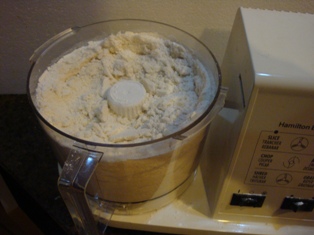
Note: Alton Brown on the Food Network suggests using 1/6 cup vegetable shortening and 1/3 cup butter (for a total 1/2 cup of both together); because they will melt at different temperatures. It makes a a lighter, flakier crust. Another key is to keep all the ingredients, especially the butter, shortening and water are very cold.
A visitor suggests substituting coconut oil for the Cisco vegetable shortening. She says she used "3 tbs. (1/6 c.) coconut oil and 1/3 c. butter and the crust turned out flaky and fabulous!"
Step 2 - Mix and add water as needed
Then sprinkle in the water, just enough water to make it hold together; a good dough consistency. A pastry blender (see photo) works very well to mix, but some people prefer a few seconds in a food processor instead. Just mix it enough to make it into pieces that hold together about the size of a pea. We don't want to overmix it!
Chill?
If you have time, put the dough (wrapped in plastic wrap or a ziploc bag) into the fridge to rest and chill for a half hour or more. If you don't have time, don't worry, just move on to step 3.
Step 3 - Roll out the dough
I use a pie crust bag (a circular plastic bag that zips up around the edge, but two pieces of waxed paper will work). A couple of tablespoons of flour shaken in the bag will help to keep the dough from sticking to the bag.
If you would like one of these bags, you can order them through Amazon below for less than $5 (and a few cents of the order goes to keeping this website going!)
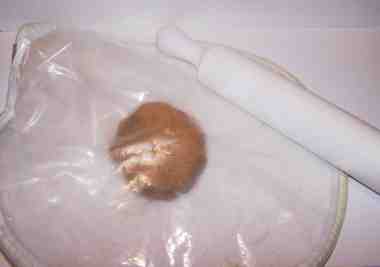
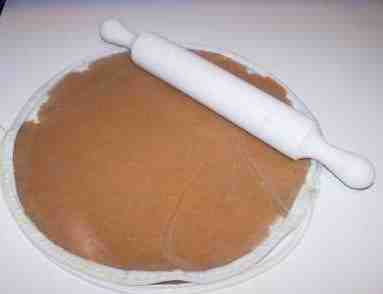
Roll it out to an even thickness, and just an inch or two wider
than your pie pan. My crusts are about 1/8 inch thick.
Step 4 - Put in the pie pan and shape!
Place the dough into the pie pan. Don't worry if it breaks. You can easily fix that.

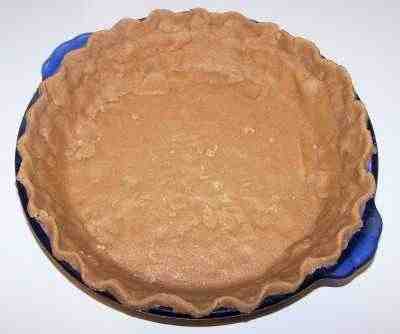 Press the dough into the pan, seal any broken areas, and
shape the top edge in any pattern you like; just for appearance's sake.
Press the dough into the pan, seal any broken areas, and
shape the top edge in any pattern you like; just for appearance's sake.
It's now read for you to add the pie ingredients and pop in the oven!
And these pie crust shields prevent the crusts from burning. This oven-safe silicone one is some much better than the old aluminum ones (but I have that one, too, if you prefer it.). The pie weights are very useful, too, for prebaked crusts!
Ingredients
- a pie pumpkin (see step 1; you can use different types of pumpkin or even a butternut squash)
- 1 cup sugar (see step 9 for alternatives, such as Stevia, honey or Splenda) (metric: 200 grams)
- 1.5 teaspoon ground cinnamon (metric: 3.8 grams)
- 1 teaspoon ground cloves (metric: 2 grams)
- 1 teaspoon ground allspice (metric: 2 grams) ( Other names for allspice are: Piment de la Jamaïque, Maustepippuri, Kryddpeppar, Piment, Korzennik lekarski, Ienibahar, Pimentovník pravý)
- 1/2 teaspoon ground ginger (metric: 1.25 grams)
- Optional: 1/2 teaspoon mace (which you'll find in the very old pumpkin pie recipes)
- 1/2 teaspoon of vanilla extract (optional) (metric: 20 grams)
- 1/2 teaspoon salt (optional, I don't use any)
- 4 large eggs - to reduce fat and cholesterol, you may use egg whites (like "Egg Beaters) instead, and vegans may want to use Ener-G (see this page for more information about egg substitutes)
- 3 cups pumpkin glop (ok... "sieved, cooked pumpkin") (metric: 0.7 litre)
- 1.5 cans (12oz each) of evaporated milk (I use the nonfat version) for best results. (metric: each can is about .35 liter, or about a half liter total))
Note for the UK and Europe: Nestle Carnation has two sizes of cans in England: 170g and 410g - the large 410g can is 14 fl. oz. and the small 170g can is 5 fl. oz. (the same as the small can in the US). Use one of each (19 fl. oz. total) in your pie.
Other notes:
If you can't get canned evaporated milk, make your own from nonfat dried milk and make it twice as concentrated as the directions on the box call for!
If you can't get nonfat dried milk, just use milk.
If you are lactose-intolerant, use lactose-free milk or soy milk.
One visitor tried fresh whipping cream (unwhipped) and reported the pie "turned out wonderful! "
Another suggests using coconut milk, if you are allergic to dairy.
Note: If you can't get evaporated milk, you can substitute nonfat dried milk - make it twice as concentrated as the directions on the box say to reconstitute it. It won't be the same as evaporated milk, but it ought to come close.
Recipe and Directions
Yield: One 9-inch deep dish pie or two 8-inch shallow pies
Step 1 - Get your pie pumpkin
Just like selecting any squash, look for one that is firm, no bruises or soft spots, and a good orange color. One 6" pie pumpkin usually makes one 10 inch deep dish pie and a bit extra; or two 9 inch shallow pies! If you have extra goop, you can always pour it into greased baking pans and make a crustless mini pie with the excess (and the cooked pies do freeze well!)
If you live in the Far East (Thailand, Japan, Korea, Hong Kong, etc.) and cannot get a pumpkin or a butternut squash, I'm told that Japanese pumpkins make a great substitute. Just cube the meat into small cubes and steam them for 35 minutes. The rest of the preparation is the same and I'm told the taste is great.
Step 2 - Prepare the pumpkin for cooking
Cut the pumpkin in half. A serrated knife and a sawing motion works best - a smooth knife is more likely to slip and hurt you! A visitor suggests using a hand saw.
Step 3 - Scoop out the seeds...
Note: SAVE THE SEEDS:
The seeds can be used either to plant pumpkins next year, or roasted to eat this year! Place them in a bowl of water and rub them between your hands. then pick out the orange buts (throw that away) and drain off the water. Spread them out on a clean towel or paper towel to dry and they're ready to save for next year's planting or roast. Click here for roasting instructions! (opens in a new window)
Step 4 - Cooking the pumpkin
There are several ways to cook the pumpkin; just choose use your preferred method. Most people have microwaves and a stove, so I'll describe both of those methods here. But others make good arguments in favor of using a pressure cooker or baking in the oven. At the end of this document, I’ve included alternative instructions to replace step 4, if you’d rather use a different method.Method 1 - Bake in the oven
You can also bake the prepared pumpkin in the oven, just like a butternut squash. This method takes the longest. Basically, you cut and scoop out the pumpkin as for the other methods, place it cut side down into a covered oven container. Cover the ovenproof container (with a lid), and pop it in an 350 F (165 C) oven. It normally takes about 45 minutes to 90 minutes (it can vary a lot!); just test it periodically by sticking it with a fork to see if it is soft!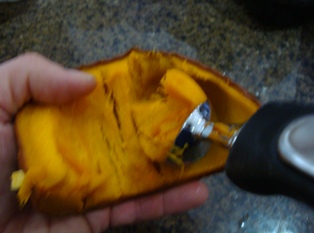
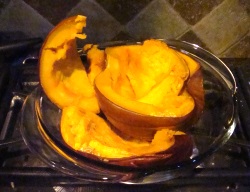
Method 2 - Steam on the stovetop
You can also cook it on the stovetop; it takes about the same length of time in a steamer (20 to 30 minutes). I use a double pot steamer, but you could use an ordinary large pot with a steamer basket inside it!: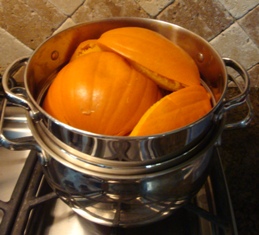
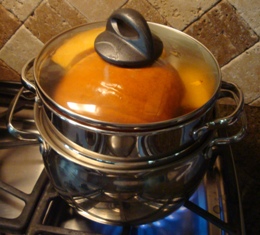
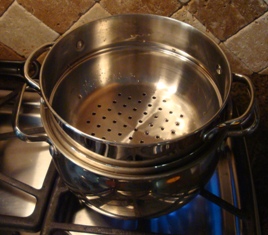
Method 3 - Put it in a microwaveable bowl
Put a couple of inches of water in the bowl, cover it, and put in the microwave. I cook it on high until it is soft. That may take 20 minutes or more, so like anything else, try 15 minutes, see how much it is softened, then do 5 minute increments until it is soft
Cook the pumpkin until it is soft
Whichever method you use, cook the pumpkin until it is soft and will separate from the skin.Step 5 - Scoop out the cooked pumpkin
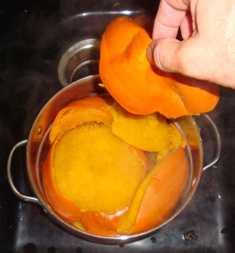 Many times the skin or rind will simply lift off with your fingers (see the photo at left) . I'll bet you didn't realize making your own pumpkin glop... err, "puree" was this easy!
Many times the skin or rind will simply lift off with your fingers (see the photo at left) . I'll bet you didn't realize making your own pumpkin glop... err, "puree" was this easy!Note: there are many varieties of pumpkin and some make better pies that other (due to sugar content, flavor, texture and water content. Drier, sweeter, fine-grained pies; the small (8" across) ones called "pie pumpkins" are best.
Watery pumpkin?
If your pumpkin puree has standing, free water, you may want to let it sit for 30 minutes and then pour off any free water. That will help prevent you pie from being too watery! Beyond, that, I have not found that the water makes a difference - I wouldn't be TOO concerned about it! The recipe accounts for the liquid!Tip on using the liquid: A visitor writes on November 26, 2009: "Any suggestions or use for the pumpkin juice left over after draining the cooked pumpkin? I keep thinking there must be some good use - maybe soup or in cookies or something?"
Yes!! You can use it as a replacement for water, and in some cases, milk, in recipes, like soups, cookies, breads, muffins and even pancakes and waffles, where it adds a very nice flavor!
Tip from a visitor: "I make my own pumkin pies from scratch all the time. To eliminate watery pumpkin I strain my pureed pumpkin through a cloth overnight. If I use frozen pumpkin I do the same again as it thaws out. It works great and my pies cook beautifully."
Another visitor reported success using coffee filters in a sieve to drain out excess water.
Again, don't go to great lengths to remove water; the recipe accounts for the fact that fresh pumpkin is more watery than canned!
Step 6 - Puree the pumpkin
A regular blender works, too (unless you made a few frozen daiquiris and drank them first..). Or a food processor or even just a hand mixer with time and patience.
With the hand blender, it just takes 2 or 3 minutes!
Another visitor says using a food mill, like a Foley Food Mill, with a fine screen, accomplishes the blending/pureeing very well, too!
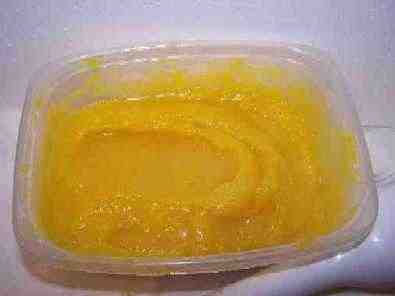 Step 7 - Done with the pumpkin!
Step 7 - Done with the pumpkin!
The pumpkin is now cooked and ready for the pie recipe. Get the frozen daiquiris out from step 6 and take a break! :) Note: You may freeze the puree or pie filling to use it later! Just use a freezer bag or other container to exclude as much air as possible. It should last a year or more in a deep freezer On the other hand, you may NOT "can" it: See this page for the safety reasons why you shouldn't can it.)
Step 8 - Make the pie crust
Yes, I know there are ready-made pie crusts in the frozen section at the store, but they really are bland and doughy. A flaky crust is easy to make! Again, note that unless you use large, deep dish pie plates, you may have enough for 2 pies.It is also time to start preheating the oven. Turn it on and set it to 425 F (210 C, for those in Europe)
Click here for illustrated pie crust instructions!
(it will open in a new window)
(it will open in a new window)
Step 9 - Mix the pie contents
All the hard work is behind you! Here's where it gets really easy. If you start with a fresh 8" pie pumpkin, you will get about 3 cups of cooked, mashed pumpkin. Th e right amount of ingredients for this is as follows:
e right amount of ingredients for this is as follows: - 1 cup sugar (metric: 300 grams). Instead of sugar, you could use
honey (use 1.25 cups),
natural sugar (1 cup),
agave (1 cup),
brown sugar (1 cup),
Stevia (1/3 cup) or
Splenda (1.25 cups).
If you are using artificial sweeteners (Splenda or Stevia) you'll find that they taste prettty good, but you'll get better results when you do a 50-50 mix with sugar or honey. And diabetics, you can use Stevia or Splenda alone, in place of sugar and get pretty decent results. - 1.5 teaspoon ground cinnamon
- 1 teaspoon ground cloves
- 1 teaspoon ground allspice
- one half teaspoon ground ginger
- one half teaspoon salt (optional, I don't use any)
- 4 large eggs
- 3 cups pumpkin glop (ok... "sieved, cooked pumpkin")
- 1.5 cans (12oz each) of evaporated milk (I use the nonfat version) (note for those in France: evaporated milk in France is called "lait concentre'"; "lait evapore'" is powder)
- 1/2 teaspoon of vanilla extract (optional) (metric: 20 grams)
Note: You may substitute 4 teaspoons of "pumpkin pie spice" instead of the cinnamon, cloves, allspice and ginger. But I think you get better results with the separate spices.
Note: The vast majority of people tell me this is the best pumpkin pie they've ever had. It's light and fluffy - however... if you want a heavy, more dense pie, use 3 eggs instead of 4 and 1 can of evaporated milk instead of 1.5)
Step 10 - Pour into the pie crust
Some people like to bake the pie crust in the oven for 3 minutes before filling it. I don't and the pies turn out great! I like a deep, full pie, so I fill it right up to about one quarter to one half inch from the very top.
I like a deep, full pie, so I fill it right up to about one quarter to one half inch from the very top.
Don't be surprised if the mixture is very runny! It may start as a soupy liquid, but it will firm up nicely in the oven! Note: the pie crust is brown because I used whole wheat flour! Tastes the same, but is healthier.
TIP: If you put the empty pie crust on your oven rack, with the rack slid partially out, you can fill it there and avoid making a mess while carrying the pie to the oven!
TIP: What do you do if you end up with more filling than will fit in your pie crust(s)? Easy! Of course, you can make another, smaller pie crust and fill a small pie pan... or just grease any baking dish, of a size that the extra filling will fill to a depth of about 2 inches (see the photo at right), and pour the extra filling in.. then bake it. It will be a crustless pumpkin pie that kids especially love! You can also use it in making pumpkin muffins or pumpkin bread!
TIP: You may want to cover the exposed edges of the crust with strips of aluminum foil to prevent them from burning! Some people make their own crust cover by cutting the rim off of a disposable aluminum pie pan!
Step 11 - Bake the pie
 Bake at 425 F (210 C ) for the first 15 minutes, then turn the temperature down to 350 F ( 175 C ) and bake another 45 to 60 minutes, until a clean knife inserted into the center comes out clean.
Bake at 425 F (210 C ) for the first 15 minutes, then turn the temperature down to 350 F ( 175 C ) and bake another 45 to 60 minutes, until a clean knife inserted into the center comes out clean.Here is the finished pie, right out of the oven:
I use a blunt table knife to test the pie. The one at left has already been stuck in the pie, and you see it comes out pretty clean, when the pie is done.

Step 12 - Cool the pie
And enjoy! Warm or chilled, with whipped cream , ice cream or nothing at all - it's great!
Warm or chilled, with whipped cream , ice cream or nothing at all - it's great!
You can even freeze the pie after cooking it. I just lay a piece of plastic wrap (cling film) tight on the pie, after it cools down, then pop it in the freezer.
Later, I take the frozen pie out of the freezer, put it in the fridge for about 24 hours, and then either heat it in the oven (350 F for about 15 minutes; just to warm it up) or the microwave for a few minutes.Alternative Cooking methods for step 4
If you don’t have a microwave, or prefer another method, try these:Stovetop steaming – Place your steaming basket or grid in the bottom of a large pot. Put enough water so it won’t boil dry in 20 minutes, and yet is not so high that the pumpkin is touching the water level. You may need to add more water during the cooking. Add the pumpkin prepared in step 3, and get the steamer going. The cooking time is only between 8 and 12 minutes, depending on the range (gas or electric), and the pumpkin literally falls off the skin.
Pressure cooker – Place your grid in the bottom of the pressure cooker. If your pressure cooker came with directions, follow those for pumpkin and/or winter squash, like butternut squash. If, like most people, you’ve long since lost the directions, try this: Add enough water to just touch the bottom of the grid or shelf that you will place the pumpkin on. Add the pumpkin prepared in step 3, put the lid with the gasket, the weight and anything else your cooker requires in place, and turn the heat on high. Once it starts hissing, turn it to medium or medium high. The cooking time should only be about 10 minutes, and the pumpkin should literally fall out of its skin.
Crockpot - Clean and slice the pumpkin and set the temperature to either high or low (depending on how soon you are able to get back to the kitchen). The crockpot is forgiving enough that the pumpkin can be left in it for a time even after it is tender, at least on the low setting. Turn off the crockpot and let the pumpkin sit in it awhile. A lot of liquid will be released as the pumpkin cools. Once the pumpkin is cool enough to handle, scrape out the flesh, place in a wire strainer, and mash with a spoon to release additional liquid. Leave the pumpkin in the strainer and place in the refrigerator for several hours to drain off any remaining liquid.